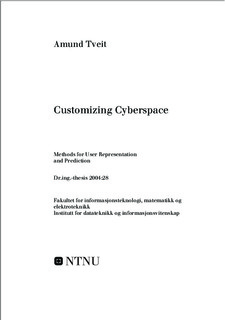| dc.contributor.author | Tveit, Amund | nb_NO |
| dc.date.accessioned | 2014-12-19T13:30:05Z | |
| dc.date.available | 2014-12-19T13:30:05Z | |
| dc.date.created | 2007-08-10 | nb_NO |
| dc.date.issued | 2004 | nb_NO |
| dc.identifier | 122589 | nb_NO |
| dc.identifier.isbn | 82-471-6259-8 | nb_NO |
| dc.identifier.uri | http://hdl.handle.net/11250/249864 | |
| dc.description.abstract | Cyberspace plays an increasingly important role in people’s life due to its plentiful offering of services and information, e.g. the Word Wide Web, the Mobile Web and Online Games. However, the usability of cyberspace services is frequently reduced by its lack of customization according to individual needs and preferences.
In this thesis we address the cyberspace customization issue by focusing on methods for user representation and prediction. Examples of cyberspace customization include delegation of user data and tasks to software agents, automatic pre-fetching, or pre-processing of service content based on predictions. The cyberspace service types primarily investigated are Mobile Commerce (e.g. news, finance and games) and Massively Multiplayer Online Games (MMOGs).
First a conceptual software agent architecture for supporting users of mobile commerce services will be presented, including a peer-to-peer based collaborative filtering extension to support product and service recommendations.
In order to examine the scalability of the proposed conceptual software agent architecture a simulator for MMOGs is developed. Due to their size and complexity, MMOGs can provide an estimated “upper bound” for the performance requirements of other cyberspace services using similar agent architectures.
Prediction of cyberspace user behaviour is considered to be a classification problem, and because of the large and continuously changing nature of cyberspace services there is a need for scalable classifiers. This is handled by proposed classifiers that are incrementally trainable, support a large number of classes, and supports efficient decremental untraining of outdated classification knowledge, and are efficiently parallelized in order to scale well.
Finally the incremental classifier is empirically compared with existing classifiers on: 1) general classification data sets, 2) user clickstreams from an actual web usage log, and 3) a synthetic game usage log from the developed MMOG simulator. The proposed incremental classifier is shown to an order of magnitude faster than the other classifiers, significantly more accurate than the naive bayes classifier on the selected data sets, and with insignificantly different accuracy from the other classifiers.
The papers leading to this thesis have combined been cited more than 50 times in book, journal, magazine, conference, workshop, thesis, whitepaper and technical report publications at research events and universities in 20 countries. 2 of the papers have been applied in educational settings for university courses in Canada, Finland, France, Germany, Norway, Sweden and USA. | nb_NO |
| dc.language | eng | nb_NO |
| dc.publisher | Fakultet for informasjonsteknologi, matematikk og elektroteknikk | nb_NO |
| dc.relation.ispartofseries | Doktoravhandlinger ved NTNU, 1503-8181; 2004:28 | nb_NO |
| dc.relation.haspart | Matskin, Mihhail; Tveit, Amund. Mobile Commerce in WAP-based Services. Journal of Database Management. 12(3): 27-35, 2001. | nb_NO |
| dc.relation.haspart | Tveit, Amund; Rein, Øyvind; Iversen, Jørgen Vinne; Matskin, Mihhail. Scalable Agent-Based Simulation of Players in Massively Multiplayer Online Games. Proceedings of the 8th Scandinavian Conference on Artificial Intelligence, 2003. | nb_NO |
| dc.relation.haspart | Tveit, Amund. Empirical Performance Evaluation of the Zereal Massively Multiplayer Online Game Simulator. . | nb_NO |
| dc.relation.haspart | Tveit, Amund; Tveit, Gisle B.. Game Usage Mining: Information Gathering for Knowledge Discovery in Massively Multiplayer Online Games. Proceedings of the International Conference on Internet Computing: 24-27, 2002. | nb_NO |
| dc.relation.haspart | Tveit, Amund; Hetland, Magnus Lie. Multicategory Incremental Proximal Support Vector Classifiers. Proceedings of the 7th International Conference on Knowledge-Based Information & Engineering Systems (KES’2003) - Lecture Notes in Artificial Intelligence (LNAI): 386-392, 2003. | nb_NO |
| dc.relation.haspart | Tveit, Amund; Hetland, Magnus Lie; Engum, Håvard. Incremental and Decremental Proximal Support Vector Classification using Decay Coefficients. {Proceedings of the 5th International Conference on Data Warehousing and Knowledge Discovery (DAWAK’2003) - Lecture Notes in Computer Science (LNCS), 2737: 422-429, 2003. | nb_NO |
| dc.relation.haspart | Tveit, Amund; Engum, Håvard. Proximal Support Vector Machine Classifier using a Heap-based Tree Topology. . | nb_NO |
| dc.relation.haspart | Tveit, Amund. Empirical Comparison of Accuracy and Performance for the MIPSVM Classifier with Existing Classifiers. . | nb_NO |
| dc.title | Customizing Cyberspace: Methods for User Representation and Prediction | nb_NO |
| dc.type | Doctoral thesis | nb_NO |
| dc.contributor.department | Norges teknisk-naturvitenskapelige universitet, Fakultet for informasjonsteknologi, matematikk og elektroteknikk, Institutt for datateknikk og informasjonsvitenskap | nb_NO |
| dc.description.degree | dr.ing. | nb_NO |
| dc.description.degree | dr.ing. | en_GB |
